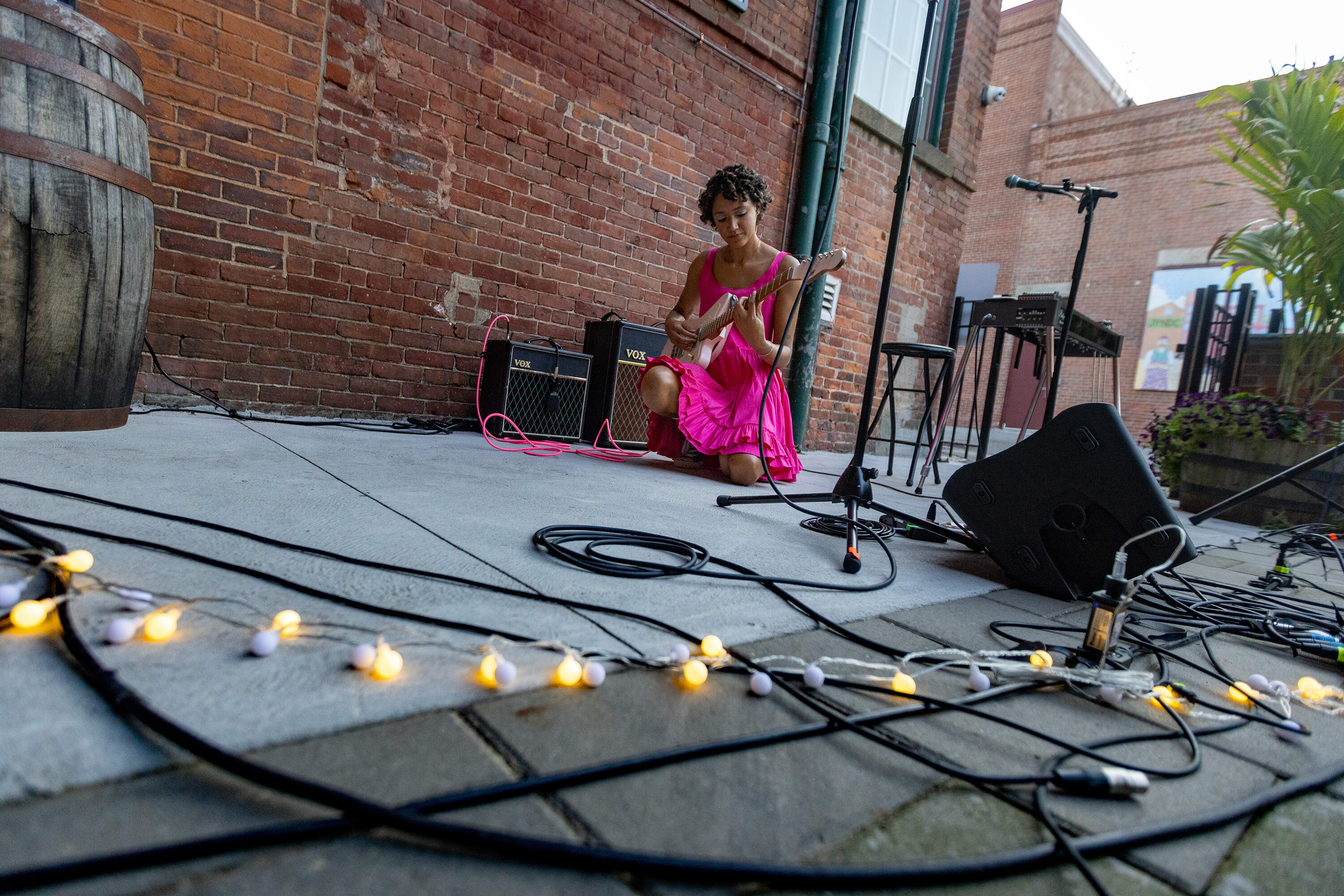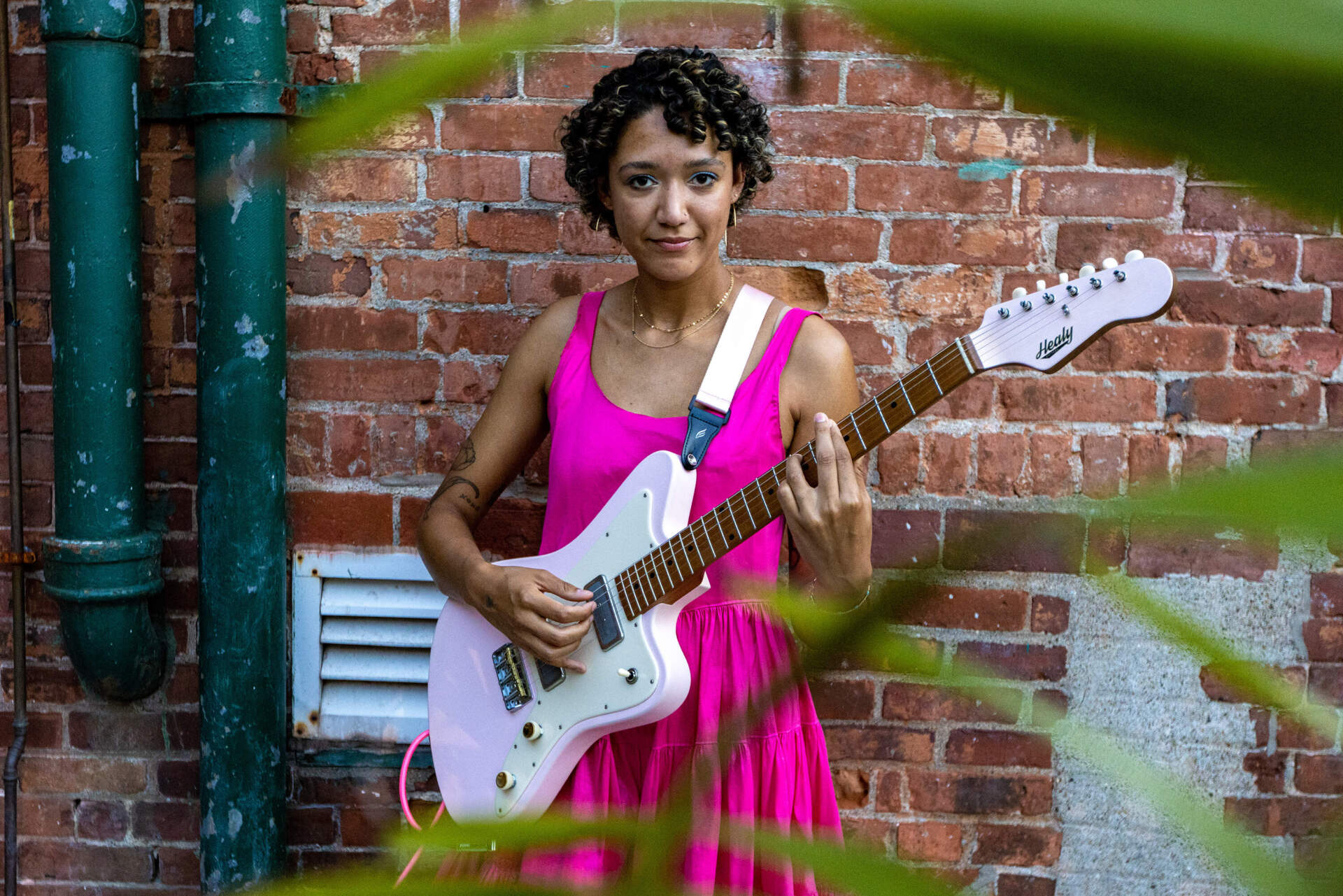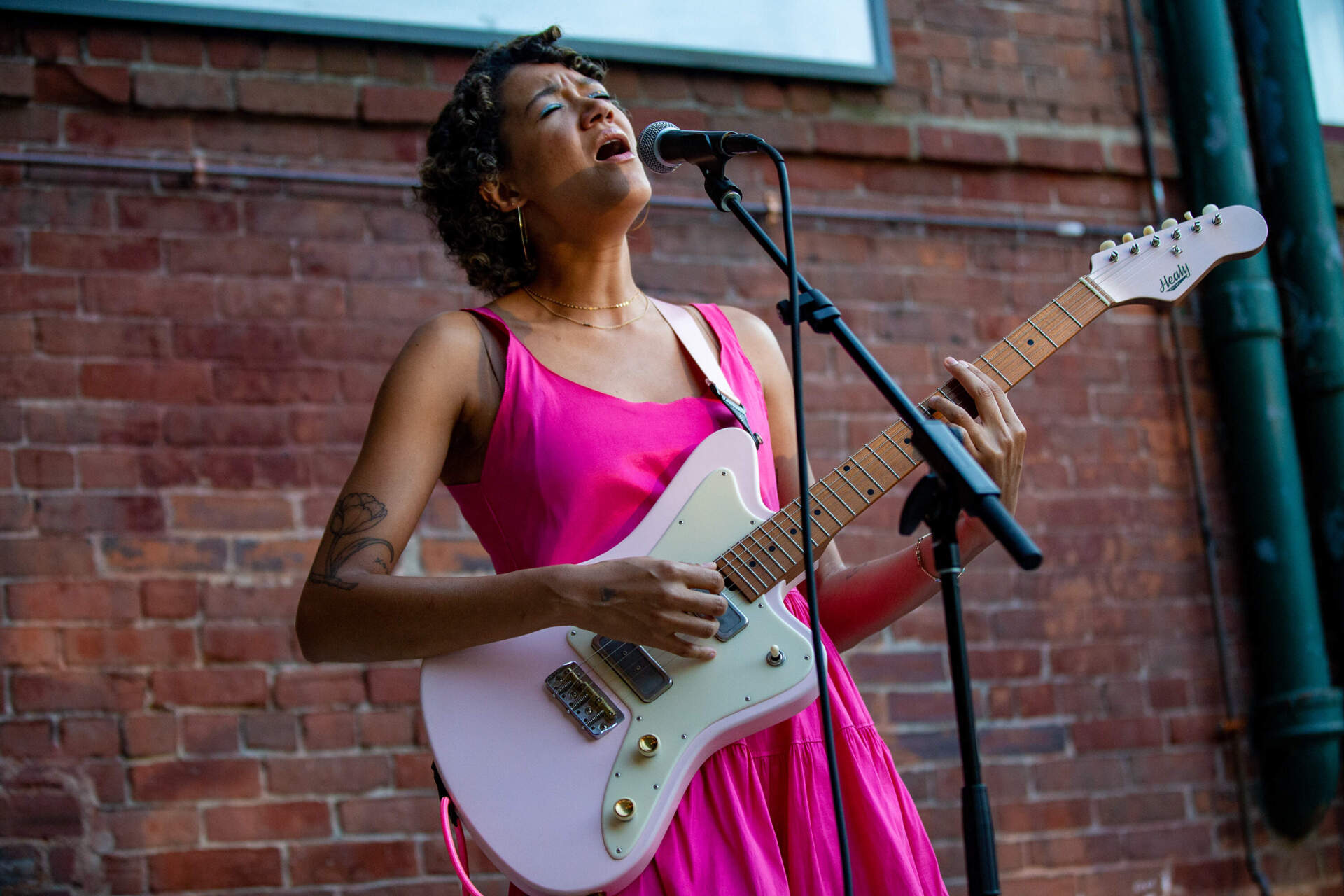
In the wake of loss, singer-songwriter Kimaya Diggs comes into her own
It was a blissful August evening at the Sam Adams Brewery in Jamaica Plain. Out on the patio, Kimaya Diggs took the stage for a short solo set. She wore a hot pink dress paired with high-top Converse sneakers, and picked out a dreamy motif on her (pink) electric guitar as she introduced her song “Letting Go.”
“My mom and I … went to the Cape every summer, and every summer we had our big fight of the year,” Diggs began. “And then about 14 years ago, my mom got sick and I started imagining what it would be like to go to the Cape and not have a fight with her, because she wasn't there.”
Diggs paused, letting the guitar’s delicate strains hover in the air. “And I was able to play this song several times for my mom before she died on Mother’s Day 2021,” Diggs said, before beginning to sing. Her voice rose, longingly, at the refrain: "All we need/ For all we know/ Is practice in/ Letting go.”
During an interview at her home in Easthampton a few days later, Diggs reflected on “Letting Go” and its unsentimental take on impending loss.
“I am not, and my mom wasn't either … somebody that's like, 'Live every day as if it's your last,'” Diggs said. “I just want to live every day in a way that is fine. You know what I mean? So, sometimes I'm not doing my best living. Sometimes I'm just getting through a day. And even after I wrote the song ‘Letting Go,’ I would still have fights with my mom.”

Diggs recorded "Letting Go" for her latest album, “Quincy,” which came out in March. The album earned her a write-up in the Boston Globe, and in June she performed on the mainstage at the Green River Festival.
“Quincy” is named after Diggs’ dog who passed away during the pandemic. But the singer is clear that it is not an album about grief. Most of the songs were written while Diggs' mother was still alive. On “Quincy,” listeners are more likely to notice the retro-ish R&B arrangements — and, of course, Diggs' voice: precise, supple and, on occasion, mighty.
Diggs, 30, grew up in South Hadley, the eldest of three daughters. Her father, a doctor, and her mother, who held a doctorate in psychology, bonded over their love of dance, which encompassed everything from Scottish country dance to Balkan folk. Diggs got her start in a band with her sisters, singing children’s songs at libraries and daytime concert series.
Growing up, Diggs — whose father is Black and mother was Indian American — was often one of the only people of color in the room. Navigating Massachusetts’ predominantly white folk scene could be tricky.
“I definitely was the person that was kind of called upon to represent all brown people in the world in some spaces,” Diggs said. “Being called upon to be the spokesperson … was definitely very disorienting and confusing and frustrating and dehumanizing, in a lot of ways.”
Ultimately, though, the local music community was deeply formative for Diggs. As a teenager, she trained with a professional Vermont chorus called Northern Harmony, performing choral music from around the world: Bulgarian folk songs, American shape note, South African gospel. It was high-level stuff, sharpening her voice and teaching her to blend with other singers.
“She's so aware of what she's doing vocally,” said Heather Maloney, a Western Massachusetts-based singer-writer and friend of Diggs’.
Maloney recalled what it was like to sing with Diggs onstage for the first time. “It was like immediately singing with someone that I'd rehearsed with. She was blending and kind of picking up on the little things that I do and doing them in the harmony. I was just wowed.”
Diggs always had confidence in her voice. But for a long time, she didn't think she could write songs.
“I kind of was thinking, ‘Okay, the best thing that I could do is maybe be a backup singer for a famous person,’” Diggs said.
That changed when she was in college and picked up the guitar with the encouragement of her now-husband, Jacob Rosazza.
“I just started experimenting with it and felt a lot more free in a new context to start writing,” Diggs said. “It was very exciting.”

With Rosazza, Diggs put out her first album, "Breastfed," in 2018. The pair recorded all the parts themselves on an iPhone app, outlining folksy melodies on delicate finger-picked guitar and tapping out percussion on the inside of Diggs' dorm room desk; the results are intimate and sweet.
For “Quincy,” Diggs wanted to do something different.
“From the get-go, I knew that I wanted to be more of an active producer,” she said.
Diggs wrote a lot of the songs with a full band in mind. She wanted the album to sound summery and warm and a little improvisational. Corinne Bailey Rae's self-titled 2006 neo-soul album was a touchstone, as were jazz-adjacent singers like Lianne La Havas. It was Diggs’ first time recording a full-length project in a real recording studio.
“I did feel a little out of my depth a lot of times,” she said. “But my commitment to myself with this album, I was like, if I have a strong idea, I am just going to honor myself by following through with it.”
And so, strangely, the album recorded in the aftermath of loss represents Diggs coming into her own.
She is especially proud of “But I Do,” a slinky number that also features her dad on flute. Diggs wanted the song, which is about forbidden desire, to feel loose and unpredictable. “I just had to hold that vision in my mind and be like, ‘I know that what I'm thinking of is going to be good,’” she said. “I'm really proud of how it turned out.”
Last month, Diggs released an EP of live versions of some of the songs on “Quincy.” The stripped-down context took its own kind of confidence to pull off. Diggs and Rosazza recorded the songs in their backyard: just guitar, bass, Diggs’ voice and the birds.
This segment aired on October 16, 2023.

